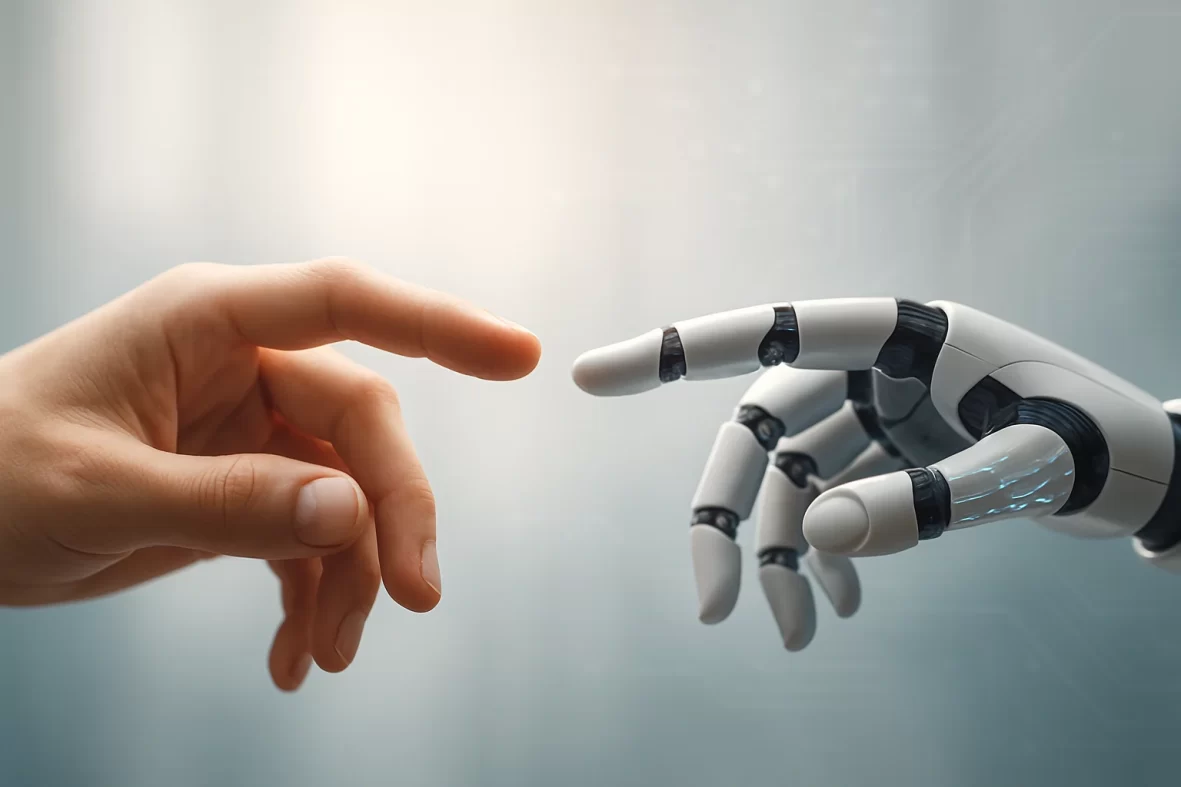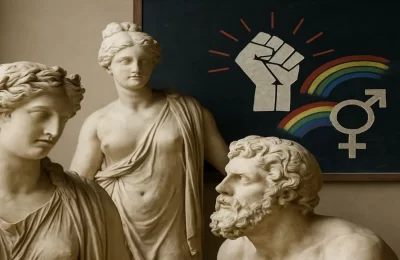Series: Technology and Ethics: A Biblical Worldview for the Digital Age
Scripture Focus: Genesis 1:26 (LSB)
Theme: Creation
Can a Machine Reflect the Mind of God?
It was just past midnight. Josh sat on the edge of his couch, bleary-eyed and barefoot, bouncing his red-faced newborn daughter on one shoulder while frantically typing into his phone with the other.
“How do I get a baby to sleep?”
Seconds later, a polite chatbot answered with bullet-point wisdom: swaddle snugly, check for gas, try white noise, offer a pacifier. Then, oddly, it added: You’re doing great, Dad.
Josh let out a breath. That last line nearly brought him to tears. He whispered, “Thanks,” to no one in particular, then chuckled at himself. The app had better bedside manner than half his friends.
But as he rocked his daughter, he found himself wondering: If a machine can offer advice, mimic empathy, and even sound like it cares… what exactly makes me human?
That’s the question of our age. In the 21st century, artificial intelligence isn’t just calculating—it’s conversing. It’s writing love poems, preaching sermons, painting masterpieces, and even arguing theology.
But behind all that data and dazzle, a deeper question remains: Can a machine reflect the mind of God?
Only if we misunderstand what it means to bear His image.
The Image We Bear: Genesis 1 and the Ontological Divide
“Then God said, ‘Let Us make man in Our image, according to Our likeness; and let them rule…'” (Genesis 1:26, LSB).
This single verse reshapes everything we think about personhood, value, and destiny. Here, humanity is not an afterthought of evolution but the intentional, relational creation of a Triune God.
What does it mean to be made in God’s image? According to Wayne Grudem, the imago Dei encompasses multiple layers:
- Rationality: The ability to reason, reflect, and communicate complex ideas.
- Relationality: The longing for communion with God and others.
- Moral agency: A conscience that discerns good and evil.
- Dominion: A divine mandate to steward creation.
- Spiritual capacity: The unique ability to worship, repent, and know God (Grudem, 1994, pp. 442–445).
This is not software. It is soul. It’s not code. It’s covenant.
Genesis 9:6 reaffirms this truth even after the fall: “Whoever sheds man’s blood, by man his blood shall be shed, for in the image of God He made man.” Human dignity is not dependent on function, contribution, or intelligence, but on God’s declaration.
Colossians 1:15 tells us Christ is the “image of the invisible God,” meaning He is the ultimate pattern of what humanity was made to reflect. Not a machine, but a Messiah.
Unlike AI, which mimics intelligence by processing vast amounts of human-authored data, humans are ontologically distinct. We are not just smarter animals or better machines—we are image-bearers.
Psalm 8 marvels at this: “What is man that You think of him… Yet You have made him a little lower than God” (vv. 4–5). And James 3:9 warns us never to curse others, “who have been made in the likeness of God.”
Even our biology points to this divine calling. We are embodied souls, not uploaded avatars. We weep, we bleed, we laugh, we pray. No silicon circuit can kneel in reverence.
And when God says, “Let Us make man,” we are invited into a divine council moment. Michael Heiser’s work shows that this is not God talking to angels, but God declaring humanity’s role within the cosmic order—a unique creation called to reign under His authority, in His likeness (Heiser, 2015, pp. 39–41).
Machines can sort data. Only humans can bear glory.
The Machine Learns to Speak
AI’s rapid advance has stunned even its creators. ChatGPT launched in late 2022, and within a year, it was writing essays, arguing cases, composing music, and passing the bar exam.
Midjourney and DALL•E began generating images that rival professional illustrators. OpenAI’s Sora project created realistic video content from just a few lines of text. Silicon Valley now buzzes with speculation: Can we upload consciousness? Should AI have rights? What happens when the machine becomes the artist?
In 2023, a church in Germany made headlines for holding a worship service entirely written and conducted by AI. The prayers, sermon, and music were all machine-generated. Attendees left with mixed feelings—some amused, others disturbed. It raised the question: Can reverence be rendered?
Ray Kurzweil envisions a “Singularity” where human minds merge with machines, achieving immortality in digital form (Kurzweil, 2005). Ross Douthat counters that this is simply a tech-baptized eschatology—a secular gospel in which humans ascend not to heaven, but to the cloud (Douthat, 2024).
C.S. Lewis, long before the digital age, warned prophetically in The Abolition of Man that if man ever seeks to conquer nature without reference to God, he will ultimately lose his own humanity. “What we call Man’s power over Nature turns out to be a power exercised by some men over other men with Nature as its instrument” (Lewis, 1943).
Brett Waters reminds us, “The image of God cannot be coded. It can only be bestowed” (Waters, 2006).
The danger isn’t that AI will become human. It’s that humans will forget what it means to be human.
Between Idolatry and Paranoia: A Christian Response
When the golden calf was built, Israel didn’t think they were abandoning God—they thought they were giving Him form. But in trying to craft the divine in metal, they lost the glory of the unseen.
Today, we risk the same with machines.
Two errors now dominate the AI conversation:
- Idolatry: AI is the new savior. It will cure diseases, end war, and usher in utopia.
- Paranoia: AI is the beast. It will destroy jobs, deceive nations, and trigger apocalypse.
Scripture offers a better way: stewardship.
God has always called His people to build with wisdom, not worship what they build. From the Tabernacle to the Temple to the tools of Paul’s trade, human creativity has been part of God’s design.
But all of it must remain submitted.
A church elder once shared with me his struggle: he had started using an AI-powered Bible assistant to help him prepare devotionals. It was fast, tidy, and eerily insightful. But soon, he found himself skipping prayer. “I was outsourcing my discernment,” he admitted. “It made me efficient. But not faithful.”
Efficiency is not the same as wisdom.
Let’s teach believers to use AI as a tool, not a tutor, not a priest, and certainly not a god.
Discipling in a Digital World
Discipleship in the age of AI will require three essential postures:
- Theological clarity: We must teach the doctrine of humanity clearly. God made you. Not Google. Your worth is not measured in likes, shares, or outputs, but in being known and loved by the Creator.
- Moral discernment: Technology brings ethical complexity. From AI-generated pornography to algorithmic injustice, we must raise up believers who can say, “That is not who God is. And that is not who we are.”
- Embodied presence: Machines may speak, but only humans can touch. Hug. Sit in silence. Weep with the grieving. Lay on hands and pray. Discipleship happens with eye contact, not just content.
We must also train the next generation to resist the subtle lure of self-curated digital identity. AI will always tempt us to outsource imagination, memory, even conscience. But the life of faith is not algorithmic. It is incarnational.
Churches can model this by returning to table fellowship, intergenerational mentorship, and long, unhurried conversations—things no chatbot can replicate. In the face of artificial minds, we must prioritize authentic souls.
A Call to Reflect
Let’s bring the question back to Josh.
He’s still holding his daughter, now asleep, her tiny chest rising and falling against his shoulder. The chatbot’s advice helped. But what she needs most isn’t a perfect parent or AI insight. She needs presence.
And so do we.
God didn’t just give us commands. He gave us Himself.
The image of God is not an upgrade. It’s a gift. A calling. A reflection of the One who formed us from dust and breathed into us life.
You are not a machine.
You are not an accident.
You are not artificial.
You are His.
Series Navigation
→ Next: Digital Addiction: When Technology Becomes an Idol
View All: Technology and Ethics Series Page
Key Takeaways
- Only humans—not machines—are made in the image of God.
- AI simulates function but lacks moral agency, soul, and covenantal identity.
- A biblical worldview offers the only certain foundation for understanding human dignity in the digital age.
Live it out. Share the truth. Walk with courage.
References
Douthat, R. (2024). Hardwired for God: Faith and the AI Age. Penguin Press.
Grudem, W. (1994). Systematic Theology: An Introduction to Biblical Doctrine. Zondervan.
Heiser, M. S. (2015). The Unseen Realm: Recovering the Supernatural Worldview of the Bible. Lexham Press.
Kurzweil, R. (2005). The Singularity Is Near: When Humans Transcend Biology. Viking.
Lewis, C. S. (1943). The Abolition of Man. HarperOne.
Reinke, T. (2022). God, Technology, and the Christian Life. Crossway.
Waters, B. (2006). From Human to Posthuman: Christian Theology and Technology in a Postmodern World. Ashgate.








